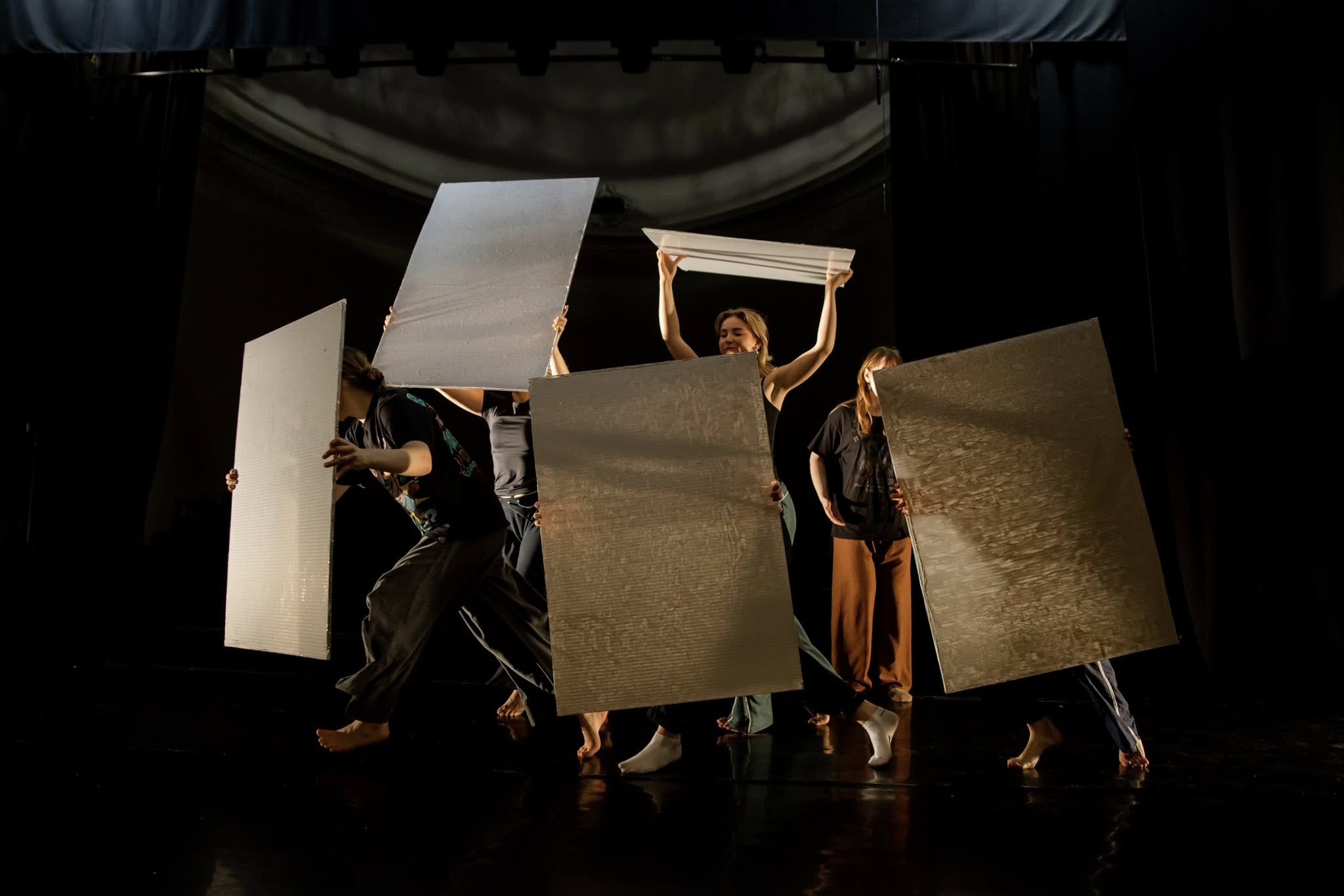On April 29, 30, and May 6, the premiere of a contemporary dance performance titled Replika will take place at Vilnius University (VU) Theatre Hall. Presented by the VU Kinetic Theatre and directed by Andrius Pulkauninkas, Replika is a bold, boundary-pushing experiment in the performing arts where artificial intelligence (AI) takes on the role of co-creator. In this work, AI emerges as a fully-fledged artistic voice—not merely assisting but actively creating: shaping visual structures, evoking emotions, and raising fundamental questions about our identity and our relationship with technology.
GET TICKETS!
A dialogue between a human and AI
Director Andrius Pulkauninkas emphasizes that AI in this process was not just a tool, but a co-creator. "Artificial intelligence in this performance is no longer just a technical solution. It creates a visual language that at times feels even unsettling. Human features become distorted: eyes turn cross-eyed or crazed, gazes lose direction, and the shape of the face fractures. Clothes change their textures and colors, strange forms and squares appear on them—as if the AI is making mistakes, yet at the same time crafting a new aesthetic. AI doesn’t offer a ‘correct’ image—it proposes mutation, reinterpretation, a strange but impactful alternative," the director explains.
A. Pulkauninkas draws attention to the element of unpredictability that emerges when collaborating with artificial intelligence. "One of the most exciting qualities of AI is its autonomy. It often creates things we didn’t even ask for—unexpected objects, textures, visual solutions that suddenly evolve from a technical component into an independent artistic expression. These moments are not only visually striking, but also thought-provoking—it's like entering a dialogue where AI doesn’t answer the question you asked, but tries to guess why you asked it in the first place. What AI generates often reminds me of free verse—without a clear structure, but gaining value when someone from the outside says: ‘this is meaningful.’ AI creates seemingly out of nothing—without emotion, without intention—but we give meaning to its output. And when it unexpectedly resonates with our inner intuition, we accept it as affirmation. It becomes a reciprocal game—we search for AI’s approval, and its ‘answers’ only become meaningful because we choose to see them that way,"Pulkauninkas shares about the creative process.
He adds that in this way, a strange but powerful feedback loop emerges between human and AI—a conversation in which both sides search for meaning in each other. It is precisely in this uncomfortable, yet wildly fascinating space that Replika is born.
The performance as a movement manifesto
Replika explores the intersection between humans and artificial intelligence through dance, imagery, and sound. The performance unfolds in 12 short acts, each representing a distinct stage in the evolution of life, consciousness, or civilization. The movement compositions range from synchronized contact structures to deconstructed, individualized fragments. The choreography was developed in close collaboration with the dancers of Vilnius University’s Kinetic Theatre, who were given choreographic prompts inspired by biological and physical phenomena—from planetary formation to reflections on consumerist society. On stage, hybrid bodies emerge—both physically and aesthetically. Here, movement becomes a metaphor for life: replicating, transforming, constantly reembodying in new forms. The performance invites audiences to reconsider what it means to be alive in a world where copies can sometimes replace originals, and where emotions and relationships may be simulated not by humans, but by algorithms.
Body, Code, and Creators
Replika is not only a technological or biological term—it is a metaphor for our constant adaptation, renewal, and self-reflection. Each movement in the performance is a replica, echoing timeless questions of existence: What is love? Freedom? Identity? Belonging? Where does the human end—and where does its technological version begin? The performance’s projections portray not only physical transformations—from molecules to the human form—but also emotional landscapes, in which AI becomes more than just an observer or imitator. It ultimately emerges as a creator in its own right. Within the visual layers, the organic merges seamlessly with the synthetic: plastic, metal, textile, and electronics become the building blocks of a new world—a new reality. Replika is a mirror we all gaze into. Sometimes, we recognize ourselves. Sometimes—only the copy. The creative team behind Replika includes director Andrius Pulkauninkas, choreographer Goda Laurinavičiūtė, projection artist Šarūnas Kuckailis, composer Kotryna Jančauskaitė, and set designer Eglė Jovaišaitė. In this piece, AI acts as a fully-fledged creator—the author of projections whose generated imagery is not merely a background element, but an active dramaturgical force.
The premiere performances by Vilnius University’s Kinetic Theatre will take place on April 29, 30, and May 6 at 7:00 PM in the VU Theatre Hall.
The event is organized by the Vilnius University Culture Center.




